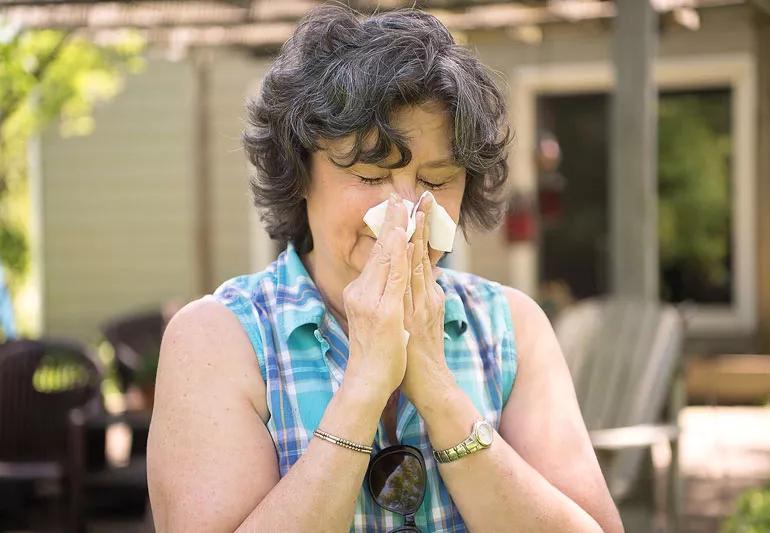Your best ways to get seasonal allergy relief

As the weather heats up, so do seasonal allergies. And if you’re among the nearly 50 million Americans who experience allergic reactions, chances are pollen is now your sworn enemy.
Advertisement
Cleveland Clinic is a non-profit academic medical center. Advertising on our site helps support our mission. We do not endorse non-Cleveland Clinic products or services. Policy
But chin up – while you may have lost some allergy battles, you don’t have to lose the war. “You can get control of allergy symptoms by taking certain medications and making small tweaks to your warm-weather routine,” says allergist Sandra Hong, MD. Dr. Hong explains what you need to know to put your allergies in their place.
Spring allergies — like most others — are usually a case of mistaken identity. Your body sees harmless plant pollens as a dangerous enemy, causing the immune system to act.
“Your body releases chemicals called histamines,” says Dr. Hong. “In the case of seasonal allergies, histamines trigger the sneezes, runny noses and itchy eyes to get pollen out of your system.”
While allergy season doesn’t officially start until the end of March in the Midwest, other parts of the country must grab their tissues much sooner.
“It depends on how warm the weather is,” says Dr. Hong. “If it’s really warm, people experience symptoms sooner.”
A harsh winter can also make seasonal allergies more year-round. And if your area experiences an unusually wet winter, be warned: “More water in the soil means plants can grow better. And more plants equal more pollen.”
Yes, says Dr. Hong, though we don’t always understand why. Some reasons include:
Advertisement
If your plan to defeat spring allergies starts when you see those first spring buds, you’re too late. “People who have seasonal allergies should prepare for their symptoms before they start,” Dr. Hong says. Here’s how:
“Take medications before allergy season starts,” recommends Dr. Hong. “Then you have your body’s defenses in place when pollen hits — before symptoms become severe and more difficult to control.”
If you take oral immunotherapy, called sublingual immunotherapy, it is important to start the treatment 12 weeks before peak season. The same goes for over-the-counter antihistamines and steroid nasal sprays.
If you started your medication regimen late, don’t despair. There are other steps you can take to stay sneeze-free.
Run your air conditioning to keep pollens outdoors — and air purifiers may also be helpful, Dr. Hong recommends. “Keep pets out of your bedroom too, since they also have pollen on their coats,” she notes. You should also avoid drying clothing outdoors and take a shower and change your clothes before going to sleep.
If you’re planning a trip, research your destination to determine what allergens will be in the air. Keep the air conditioning on and the windows closed in your accommodations to reduce indoor pollen exposure by more than 90%.
If you’re driving to your destination:
To sleep more soundly during allergy season:
Since pollen counts are highest between 5 and 10 a.m., stay indoors during those times. Do the same on hot, dry, windy days when pollen counts are high.
Try not to stop and smell the roses, and avoid wooded areas, too. Admire nature from afar (if you can bear it), and wear a mask if you need to mow the lawn or tend a garden.
If you have kids with seasonal allergies:
Advertisement
Clean air conditioning vents regularly and use a high-efficiency particulate air filter (HEPA) if you have a forced-air furnace. Clean air filters frequently and air ducts at least once a year.
Kids as young as 2 years old can have seasonal allergies. Some signs that your little one isn’t just dealing with a cold include:
Another telltale sign that a child has seasonal allergies? Face rubbing, says Dr. Hong. “They’re rubbing their eyes and nose. Sometimes kids even get this tiny line, right on their nose, because they push up on it. You’ll see a little crease from all the rubbing.”
Allergy symptoms can even make it hard for your kid to concentrate in school or when playing sports. Parents might also notice that their child is eating with their mouth open (more than usual) because they can’t breathe through their nose effectively, says Dr. Hong.
Over-the-counter treatments such as saline sprays, nasal steroid sprays and antihistamines can work for children, but Dr. Hong says parents should talk to their pediatrician first.
Advertisement
And monitor how allergy medications make children feel. “Some antihistamines can cause drowsiness,” Dr. Hong says. “It’s best to either give them the medicine at night or choose one that’s made for daytime use to reduce drowsiness.”
Dr. Hong advises being proactive to manage your allergy symptoms. You or your child should see an allergist if:
Advertisement
Learn more about our editorial process.
Advertisement

Most antihistamines, like Zyrtec, are OK, but avoid decongestants for at least the first trimester

You can now get lifesaving epinephrine in a nasal spray and prefilled syringes

Drowsiness is a side effect of inflammation, disrupted sleep and, sometimes, your allergy medicine

If you’re sensitive to aspirin or other salicylates, limiting exposure is the best remedy

Mold exposure can cause allergic reactions, asthma and skin rashes

If allergies have you coughing and sniffling all night, try showering before bed, keeping the windows closed and propping your head up

If allergies make your mornings a slog, consider closing the windows and showering at night

When the trees start to bloom, your allergies can come to life — medications, closing the windows and keeping clean can help

Wearing a scarf, adjusting your outdoor activities and following your asthma treatment plan can help limit breathing problems

Your diet in the weeks, days and hours ahead of your race can power you to the finish line

When someone guilt trips you, they’re using emotionally manipulative behavior to try to get you to act a certain way